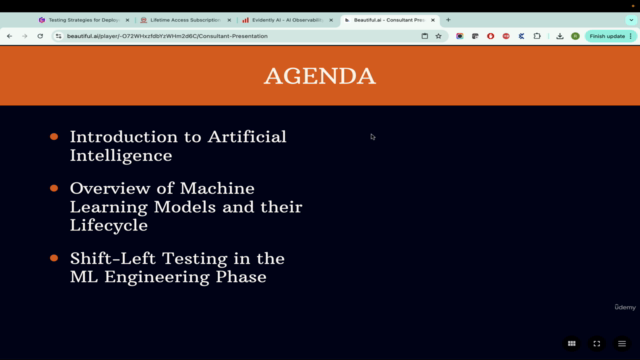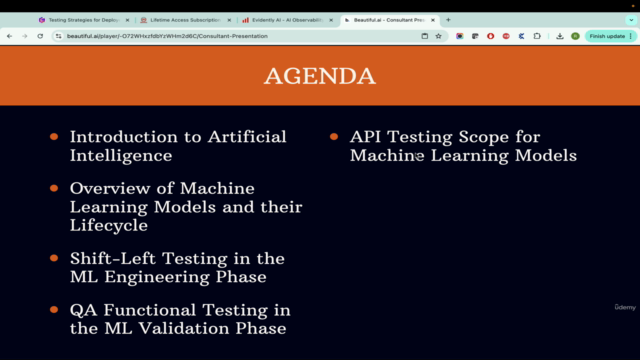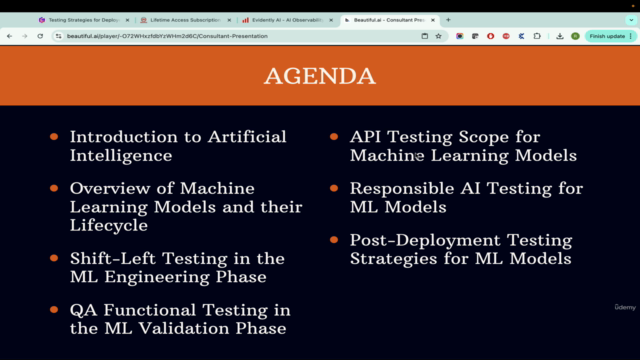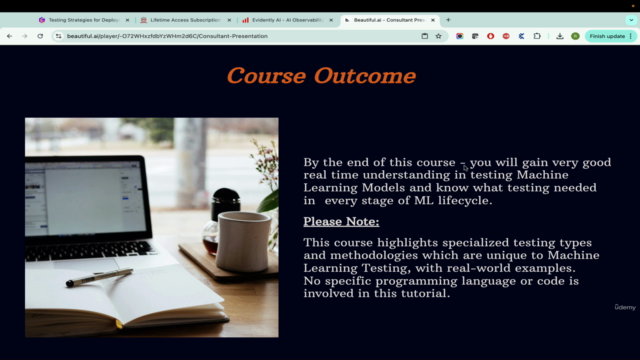Introduction to Machine Learning Models (AI) Testing

Why take this course?
🚀 Introduction to Machine Learning Models (AI) Testing 🎓
Course Headline:
From Scratch, Learn testing types and Strategies involved in all the phases of ML Models (AI) with real time examples
Course Description:
This course will introduce you to the World of Machine Learning Models Testing, where you'll dive into the unique challenges associated with AI software testing. As AI continues to revolutionize industries, many companies are developing their own ML models to enhance their business operations. However, testing these models presents a different set of challenges that differ from traditional software testing. Machine Learning Model testing requires a deeper understanding of both data quality and model behavior, as well as the algorithms that power them.
🔥 What You'll Learn:
- Foundational Concepts: Get acquainted with the fundamentals of Artificial Intelligence & Machine Learning.
- Testing Strategies: Learn about testing strategies specifically designed for Machine Learning models.
- Coverage at Every Stage: Understand how to test ML models at different stages of their lifecycle, from development to post-deployment.
- Real Time Examples: Apply your learning through real world examples and case studies.
Agenda Overview:
- Introduction to Artificial Intelligence 🤖
- The evolution of AI and its significance in today's tech landscape.
- Overview of Machine Learning Models and their Lifecycle 📊
- Comprehend the different types of ML models and stages they go through.
- Shift-Left Testing in the ML Engineering Phase ⚙️
- Learn how to integrate quality assurance early in the development process.
- QA Functional Testing in the ML Validation Phase 🕵️♂️
- Examine functional aspects of ML models to ensure they meet requirements.
- API Testing Scope for Machine Learning Models 🌐
- Understand the significance of API testing for ML models and how to perform it effectively.
- Responsible AI Testing for ML Models ⚖️
- Ensure ethical considerations are covered during ML model development and deployment.
- Post-Deployment Testing Strategies for ML Models 🚀
- Discover techniques to test ML models after they have been deployed into production environments.
- Continuous Tracking and Monitoring Activities for QA in Production 🔍
- Learn about the importance of continuous monitoring and how to implement it effectively.
By the end of this course, you will gain expertise in testing Machine Learning Models at every stage of their lifecycle, with a comprehensive understanding of the unique challenges and methodologies involved in AI model testing.
📝 Please Note: This course highlights specialized testing types and methodologies that are unique to Machine Learning Testing, and provides real-world examples for a practical learning experience.
👨🎓 No specific programming language or code knowledge is required to take this course—just a passion for AI and a curious mind ready to explore the world of ML models testing! 🤗
Join us in mastering Machine Learning Model testing, ensuring that your models are not just accurate, but also robust, reliable, and ethical. Enroll now and begin your journey into the exciting realm of AI quality assurance!
Course Gallery




Loading charts...
Comidoc Review
Our Verdict
Introduction to Machine Learning Models (AI) Testing is a well-curated course offering thorough insights into the world of ML model testing. While there's room for improvement in terms of hands-on assignments and more advanced topics, this course still serves as an excellent starting point for QA professionals wanting to upskill in machine learning testing.
What We Liked
- In-depth coverage of AI & ML fundamentals, making complex topics accessible
- Highlights unique challenges in ML model testing, bridging the gap between traditional software testing
- Comprehensive agenda with real-world examples and strategies for each phase of ML lifecycle
- Clear explanations of model behavior and algorithms, enhancing understanding of data quality
Potential Drawbacks
- Lacks hands-on experience, with limited practical assignments using actual datasets
- Some content is theoretical, causing difficulty in applying the concepts in real projects
- Occasional challenges in comprehension due to intricate subjects and fast-paced delivery
- Desire for more advanced content on AI development testing with Python automation